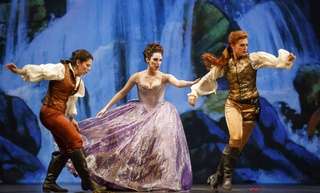|
Back
Full fantasy brought forth Toronto
The Elgin Theatre
10/23/2014 - & October 25, 26, 28, 31, November 1, 2014
George Frideric Handel: Alcina, HWV 34
Meghan Lindsay (Alcina), Mireille Asselin (Morgana), Wallis Giunta (Bradamante), Allyson McHardy (Ruggiero), Kresimir Spicer (Oronte), Olivier Laquerre (Melisso), Artists of Atelier Ballet
Opera Atelier Chorus, Tafelmusik Baroque Orchestra, David Fallis (conductor)
Marshall Pynkoski (director), Jeannette Lajeunesse-Zingg (choreographer), Gerard Gauci (set designer), Michael Gianfrancesco (costume designer), Bonnie Beecher (lighting designer), Ben Shirinian (film director)

A. McHardy, M. Asselin, W. Giunta (© Bruce Zinger)
Opera Atelier, with its performing style based on 17th and 18th century French opera-ballet, has up until now shied away from performing full-fledged opera seria. A few seasons ago they performed another Handel work, Acis and Galatea, a sort of masque/oratorio. However after producing Mozart’s Lucio Silla in Salzburg (a production that will be seen at La Scala next year), the company’s co-directors, Marshall Pynkoski and Jeannette Lajeunesse-Zingg, felt ready to tackle another opera seria. Thus: Alcina.
The opera has been shortened with the elimination of the character Oberto, a young knight (sung by a soprano) whose father is among the men imprisoned by Alcina. Another excision is the single aria for the character Melisso. This does no real harm to the work. Full attention is given to the remaining da capo arias and the dances (always an essential part of the OA experience); the running time with one interval is three hours.
The visual aspect of a production has always been a major plus with OA, but this production takes things into a whole new realm. Resident designer Gerard Gauci has collaborated with film director Ben Shirinian to give an added dynamic to the designs all in aid of furthering the fantasy that permeates the concept right from Ariosto’s epic poem of 1516 to the treatment by Handel and his librettist, Antonio Fanzaglia, premiered in 1735 at the then-new opera house in London’s Covent Garden. Shirinian’s film images seem to emerge out of Gauci’s painted drops and scrims; thus we see that Alcina has imprisoned men within sand dunes or a waterfall - and even the moon. At some points we see the face of Alcina herself emerge from the sky. At the end we are treated to a lengthy upward stream of nude men who have been released from captivity.
It isn’t all a bombardment of ever-changing images; when Alcina sings her aria lamenting her waning powers she is alone on a deep black stage with occasional shafts of light - just one example of Bonnie Beecher’s arsenal of terrific lighting effects.
The Tafelmusik Baroque orchestra under David Fallis has the Handelian style down pat. The orchestra is in its 26-member size this time, a bit small for the lovely but sound-swallowing Elgin Theatre. (Maybe it’s time to consider acoustic assistance?) It comes as a distinct relief when horn players Derek Conrod and Scott Wevers played from the stage boxes. At times a member of the continuo was lowered from the flies; this iss a terrific visual idea but far from ideal sonically.
The piece is dominated by the two sopranos and two mezzos. Meghan Lindsay, done up as a glistening ice-queen, valiantly maintained the lengthy title role, even if sounding a trifle sharp at the start. For some numbers she was brought in front of the proscenium, a wise decision given the dampening acoustics. A rival for stage supremacy was her flighty sister, Morgana, portrayed by Mireille Asselin at her sparkly best. She made the most of the work’s showcase aria, Tornami a vagheggiar. She and tenor Oronte (staunchly performed by Kresimir Spicer) are the semi-comic second couple in contrast to the fraught love triangle of Alcina, Ruggiero and Bradamante.
The two mezzos were very well-matched. Wallis Giunta makes a strong initial impression - and maintains it - as Bradamante, a woman disguised as her brother while she searches for her missing swain, Ruggiero, only to find him bewitched by Alcina. Ruggiero is the other trouser role; Allyson McHardy makes a terrific impression with the introspective, low-lying Verdi prati and later the barnstorming Stà nell’Ircana pietrosa tana, sung when he realizes he is truly free from Alcina’s grip.
Olivier Laquerre delivered his recitatives with his usual panache. The whole cast maintained the highly theatrical OA style of stage deportment (see photo above).
As for the dancing (as originally called for back in 1735 when the legendary Marie Sallé was at Covent Garden) much of it is merely decorous and results in the lessening of dramatic tension. The dancers perfectly capture the required style, bu at the finale it would have been more satisfying to include the triumphantly united Ruggiero and Bradamante in the stage scene.
Next up for OA: In April they will be producing Gluck’s Orphée et Euridice in the version (1859) by Hector Berlioz.
Michael Johnson
|